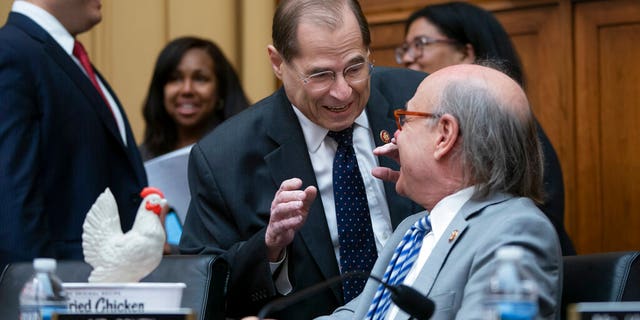The debate over impeachment is growing both deafening and dispiriting.
On one side, liberal pols and pundits argue that the Democrats have an absolute duty to make the move against Donald Trump because he's so obviously broken the law — never mind Bob Mueller's lack of charges — and is so awful that history demands action, regardless of the political drawbacks.
Other pols and pundits on the left say impeachment would be futile and self-destructive, divide the country, obliterate the Democrats' agenda — and then ultimately fail in the Senate.
This has been cranked up across the media echo chamber for days, endless iterations of the same two arguments. It's gotten, honestly, rather boring.
And there's a surreal element to it as well. Impeachment is either very likely not going to happen (as long as Nancy Pelosi wields the gavel), or it will become an empty exercise (since 20 GOP senators would have to vote to dump Trump).
But now comes a different view, from one of Trump's least favorite newspapers.
Fred Hiatt, the Washington Post's longtime editorial page editor, has actually come out against impeachment. This is startling at first glance, because the Post's editorials, and Hiatt himself, have been harshly critical of Trump for years.
In fact, the editorial board wrote when Trump was nominated in 2016 that he was "uniquely unqualified to serve as president. A Trump presidency would be dangerous for the nation and the world."
And, Hiatt says, they were right. But here's the twist:
"We thought his unfitness was evident before he was elected, and Americans chose him anyway ...
"To impeach him now for what the electorate welcomed or was willing to overlook isn't the democratic response. The right response is to defeat him in 2020."
Just in case anyone thought they were going soft on Trump.
Hiatt's argument, from the platform owned by Jeff Bezos, packs an added punch precisely because the paper has been so critical of Trump.
Many of Trump's traits — the blustering style, the mixed business record, the anti-immigrant attacks, the womanizing background, the slams against fake news — were on ample display during the campaign. People didn't think they were getting a choirboy or even a polished political practitioner. They wanted a disruptor.
On Russian interference, Hiatt says "the broad outlines were known before the election," such as Trump praising WikiLeaks for released the hacked Democratic emails.
On the Mueller report and alleged obstruction of justice, "Mueller found no underlying crime that would explain an attempt to obstruct; and Trump in the end did not prevent Mueller from completing his work ... Are we going to impeach a president for wanting to obstruct?"
Of course, Hiatt says Congress should continue to investigate and see where that leads, but should seriously pause "before impeaching Trump for the high crime of being who we knew he was before we elected him."
Now I'm sure this piece wasn't popular among some Post readers who want the president driven from the public square today. Nor will it be embraced by most of the right, which believes Trump is doing a great job and there's no case for impeaching him on the merits.
But for open-minded folks, there's a strong case here for not using the Constitution as a last resort to overturn an election, especially with another election approaching that can render a verdict on the incumbent.
On one side, liberal pols and pundits argue that the Democrats have an absolute duty to make the move against Donald Trump because he's so obviously broken the law — never mind Bob Mueller's lack of charges — and is so awful that history demands action, regardless of the political drawbacks.
Other pols and pundits on the left say impeachment would be futile and self-destructive, divide the country, obliterate the Democrats' agenda — and then ultimately fail in the Senate.
This has been cranked up across the media echo chamber for days, endless iterations of the same two arguments. It's gotten, honestly, rather boring.
And there's a surreal element to it as well. Impeachment is either very likely not going to happen (as long as Nancy Pelosi wields the gavel), or it will become an empty exercise (since 20 GOP senators would have to vote to dump Trump).
But now comes a different view, from one of Trump's least favorite newspapers.
Fred Hiatt, the Washington Post's longtime editorial page editor, has actually come out against impeachment. This is startling at first glance, because the Post's editorials, and Hiatt himself, have been harshly critical of Trump for years.
In fact, the editorial board wrote when Trump was nominated in 2016 that he was "uniquely unqualified to serve as president. A Trump presidency would be dangerous for the nation and the world."
And, Hiatt says, they were right. But here's the twist:
"We thought his unfitness was evident before he was elected, and Americans chose him anyway ...
"To impeach him now for what the electorate welcomed or was willing to overlook isn't the democratic response. The right response is to defeat him in 2020."
Just in case anyone thought they were going soft on Trump.
Hiatt's argument, from the platform owned by Jeff Bezos, packs an added punch precisely because the paper has been so critical of Trump.
Many of Trump's traits — the blustering style, the mixed business record, the anti-immigrant attacks, the womanizing background, the slams against fake news — were on ample display during the campaign. People didn't think they were getting a choirboy or even a polished political practitioner. They wanted a disruptor.
On Russian interference, Hiatt says "the broad outlines were known before the election," such as Trump praising WikiLeaks for released the hacked Democratic emails.
On the Mueller report and alleged obstruction of justice, "Mueller found no underlying crime that would explain an attempt to obstruct; and Trump in the end did not prevent Mueller from completing his work ... Are we going to impeach a president for wanting to obstruct?"
Of course, Hiatt says Congress should continue to investigate and see where that leads, but should seriously pause "before impeaching Trump for the high crime of being who we knew he was before we elected him."
Now I'm sure this piece wasn't popular among some Post readers who want the president driven from the public square today. Nor will it be embraced by most of the right, which believes Trump is doing a great job and there's no case for impeaching him on the merits.
But for open-minded folks, there's a strong case here for not using the Constitution as a last resort to overturn an election, especially with another election approaching that can render a verdict on the incumbent.






















